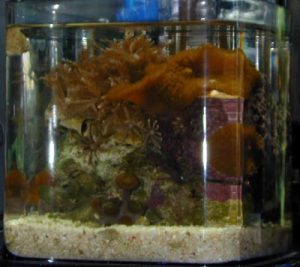What You Need to Know Before Buying Fish
Fishing for a perfect pet? Here are key tips you should know about fish before you bring one home.
Before You Buy Your Fish
-
Buy water-testing kits.
You should buy kits that test your water for the presence of ammonia, nitrate and nitrite, since significant concentrations of these substances can be lethal. A pH test kit is also preferable, although not essential. Most of these kits are relatively inexpensive.
-
 What fish should you buy?
Pick fish that will live happily in the water you can provide for them. If you are not ready to invest in a water heater, for example, stick with goldfish, which live in cooler water. Likewise, test the pH of your water and select fish that will live well in your pH range. Research various species for the conditions they prefer. Know how big certain types of fish will be when they are full-grown, and determine whether they can live comfortably in your tank. Some fish, like corys, thrive only in schools. Again, research individual species before you buy to find out their preferences.
What fish should you buy?
Pick fish that will live happily in the water you can provide for them. If you are not ready to invest in a water heater, for example, stick with goldfish, which live in cooler water. Likewise, test the pH of your water and select fish that will live well in your pH range. Research various species for the conditions they prefer. Know how big certain types of fish will be when they are full-grown, and determine whether they can live comfortably in your tank. Some fish, like corys, thrive only in schools. Again, research individual species before you buy to find out their preferences.
-
Know your tank size. You know that fish need space to move freely – so how many fish can you fit in your aquarium? There is the well-known inch-per-gallon rule. For example, a 3-inch fish needs 3 gallons of space. However, this rule applies only to slim fish. Keep in mind that if you buy round fish, they will need more space.
After You Set Up Your Tank
Feed your fish a variety of foods, not just flakes. Buy freeze-dried foods and some fresh foods. Also find out more about live foods. Not only are they good for your fish, but it’s also fun to watch them chase their prey.
-
If you go on vacation, do not use a vacation feeder.
This tablet slowly dissolves in the tank and it can upset the quality of the water. If you are leaving for a week or less, consider setting up an electrically operated feeder. Ask friends or neighbors to feed your fish only if you must leave for more than a week. If you do, ration out portions of food for each day and set up a schedule for them to administer the food. Caution them not to overfeed your fish.
-
Watch your algae.
Algae can provide a little variety in the diets of fish, but too much algae can be an indicator of bad water quality. If you can’t see your fish through a thick wall of green, you may be tempted to simply reach for an algae scrubber to clean the wall of your tank. There’s likely to be more to the problem than that. You may be overfeeding your fish (which causes filmy buildup) or not making water changes frequently enough. Remember, you should replace 25 percent of the water in your tank at least every 2 weeks.
- Be cautious about using over-the-counter medications. Ever heard of the nitrogen cycle? This is the process that converts ammonia, which is very toxic, to less harmful nitrogen compounds. The process is accomplished by bacteria that live in the tank. So if you use antibiotics, you may kill the good bacteria along with the bad and cause the ammonia level to rise. Consult your vet before you decide to use medications. Make sure that the disease is really a bacterial infection and that medication is the only way to cure it.

